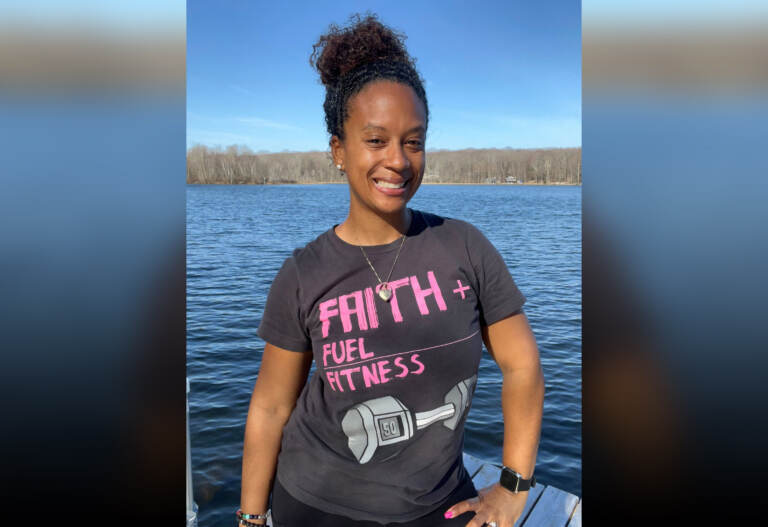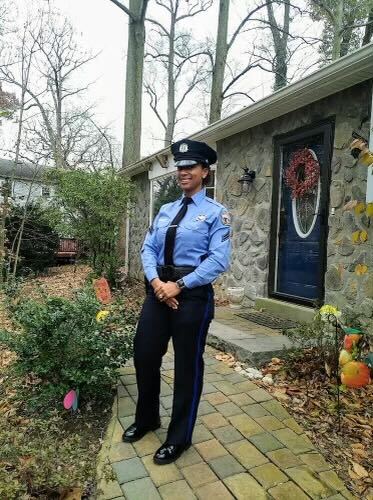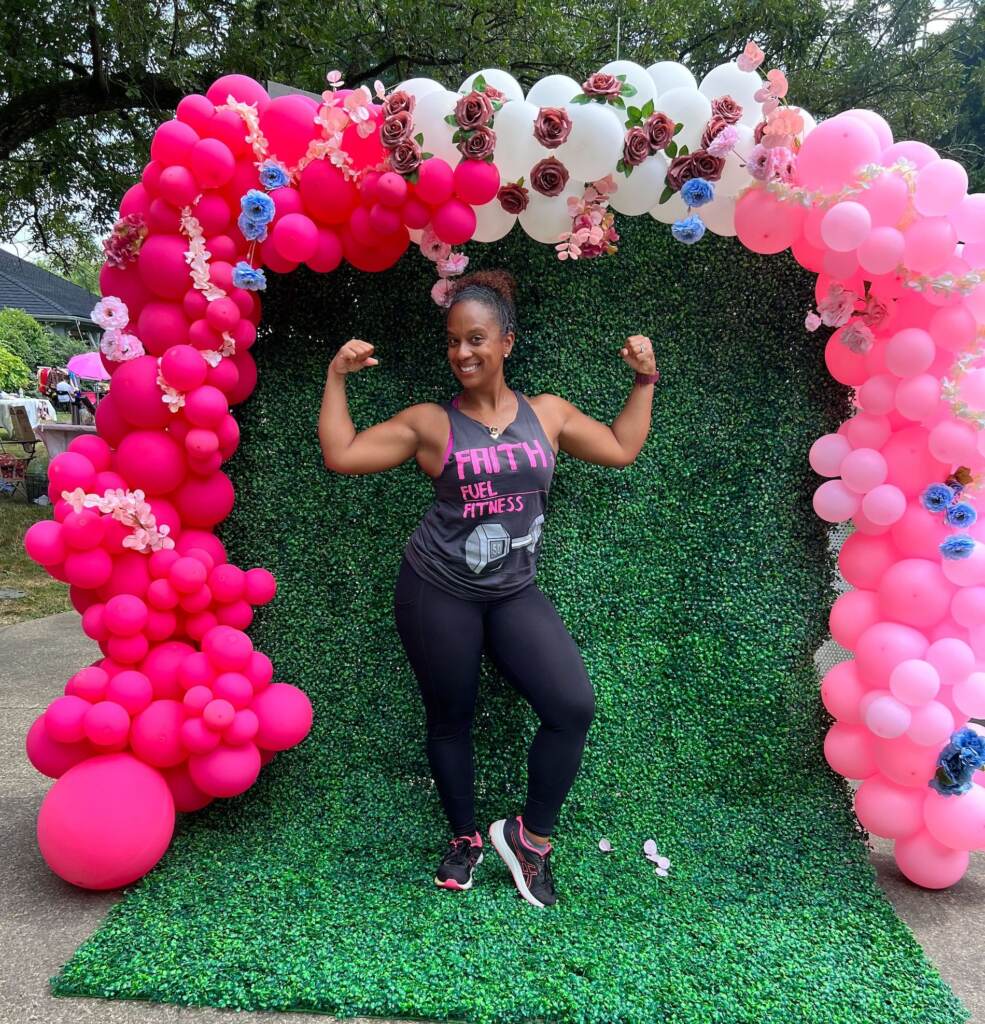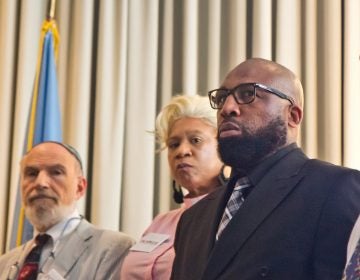Former Philly Cop Audra McCowan talks about her healing process and the aftermath of lawsuit against the city
One of the two women to win a sexual harassment judgment against former Philadelphia Police Commissioner Richard Ross talks about her healing process.
Listen 8:57
Audra McCowan wants others to know she’s here to help them if they need it too. (Courtesy of McCowan)
Audra McCowan always wanted to be a teacher. These days, she works in a school as a secretary and runs Faith Fuel Fitness, a personal training business born out of a very stressful time in her life.
“It’s a rebirth,” says McCowan, “I don’t think I would have gone through this— I wouldn’t have this business.”
In May, a federal jury awarded a one million dollar verdict to be split between McCowan, a former Philadelphia Police Corporal, and Jennifer Allen, a former police officer. The two women filed a lawsuit in 2019 alleging sexual harassment, gender discrimination, and a hostile work environment at the Philadelphia Police Department.
The suit led to the abrupt resignation of then-police Commissioner Richard Ross. McCowan says he ignored her sexual harassment complaints against another office because she broke off their relationship years before. Although the city had implemented a new sexual harassment reporting policy and other reforms, the lawsuit prompted calls for the department to more directly deal with the cultural issues impacting women and, more specifically, women of color, within the agency.
“No amount of money can ever replace what we went through,” McCowan told WHYY host Cherri Gregg, last week. “But the feeling that I got when [the verdict] came down in our favor— I just started crying because I said these people believe us.”
McCowan says the claims asserted by her and Allen were discounted or ignored for years. She says the harassment began at the very start of her career in 2004 at the academy, when she was just 20 years old. At the time, McCowan was a new mother and needed a career that could support her young son.
“There was a co-recruit, a male, who started a rumor that I performed sexual guess favors on him after supposedly we all went out to a bar,” says McCowan, noting she confronted the man, but everyone turned it into a joke.
She reported the incident, documented it via a memo, and turned it in to her sergeant. But McCowan says her complaint was tossed aside. The harassment, she says, continued at the police district, where her supervisor would proposition her for sex, in exchange for a day off.
“He did that to multiple women,” says McCowan, “I ended up learning later on that (behavior) he had gotten in trouble for the exact same things he had done to me and my partner.”
McCowan went on to document numerous other incidents and complaints. But those in power never took action.

“It is such a sexually charged environment,” she says, “and after a while, I lost faith — I wasn’t taken seriously by anyone that I reported to.”
Her co-plaintiff, Jennifer Allen, also reported a number of sexual harassment, and discriminatory incidents as well, finding little refuge within the department. McCowan had recently been promoted to corporal when she realized a lawsuit was her only recourse. She says her subordinates did not respect her authority and she had little support.
“When I saw the disrespect and I thought of all the disrespect over the years- I just knew nothing was going to happen unless I made major noise,” says McCowan.
She says her complaint led to the lawsuit, but the suit also created more stress and humiliation. McCowan asked to be moved.
“It was not an easy point in my life,” she says, “they moved me into the hallway and gave me no work.”
McCowan says took family medical leave. She says she lost friends, co-workers refused to speak to her and the stress mounted.
“I was told I would be labeled as a trouble maker- and for a moment I was ashamed,” she says, “It was hard.”
Eventually, McCowan says she made the decision to resign from the Philadelphia Police Department and end her 15-year career.
“I didn’t have a choice,” she says.
WHYY reached out to the City to get a comment about the verdict in the case filed by McCowan and Allen and a spokesman issued the following statement:
“The city of Philadelphia has decided to begin paying the judgment, thus providing some closure to the plaintiffs. The City along with Commissioner Outlaw have been making significant changes to improve the culture of the Police Department to be more supportive and encouraging of women in the Philadelphia Police Department, including but not limited to: transitioning review and evaluation of EEO claims to the City’s Employee Relations Unit, which operates within the Office of Labor and outside of PPD, updated Sexual Harassment training, improved transparency in the disciplinary process, and the PPD’s hiring of Chief Diversity Equity and Inclusion Officer Leslie Marant.”
For McCowan, the decision to leave began the healing process. She says it taught her that she is stronger than she ever thought she was. The wife and mother learned that seeking redress takes time and can be both emotionally and financially stressful. But therapy and a good support system helped her get through this process.
A key to it all, says McCowan, was the solidarity provided by Jennifer Allen.
“We leaned on each other so much,” she says, “I don’t think either one of us could have gotten through this without the other.”
McCowan says Allen- as well as the others who stood when she came forward to complain provided critical support. Today, she’s rebuilding her life and is not looking back.

“I’m looking forward to just moving on,” says McCowan, “I still want to help women—I’m trying to figure out what that looks like, how to branch out and say like, ‘Hey, I’m here.”
WHYY is your source for fact-based, in-depth journalism and information. As a nonprofit organization, we rely on financial support from readers like you. Please give today.






